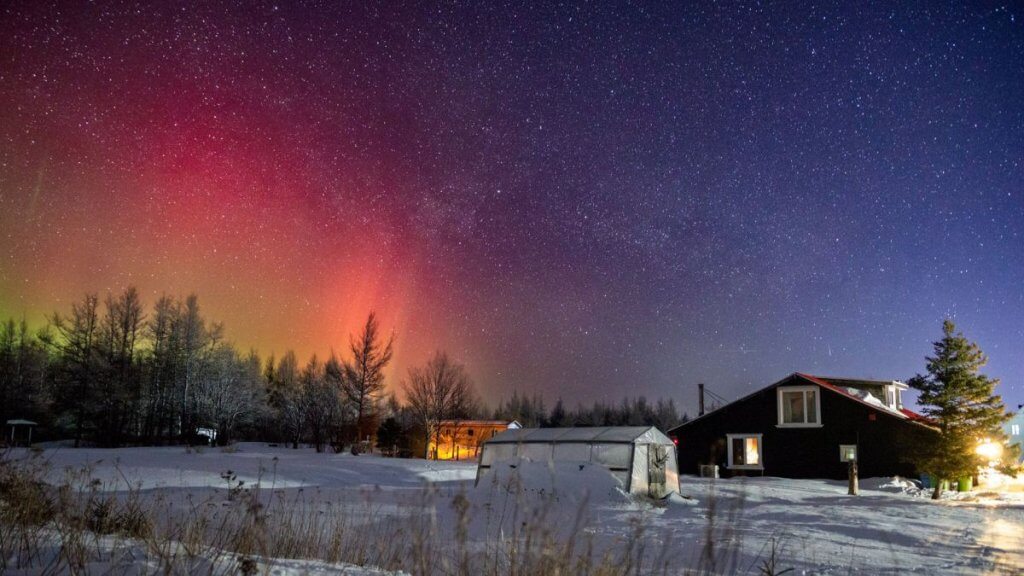
Rare red auroras explode over America’s and Europe’s north, and more are on their way (Image Credit: Space.com)
A stream of solar plasma arrived at Earth last night (Feb. 16), supercharging the atmosphere with particles from the solar wind that triggered rare red aurora displays across vast portions of Canada, northern U.S. and Europe. And space weather forecasters promise that more is on its way.
Twitter has been virtually awash over the past days with skywatchers’ images and accounts of spectacular aurora sightings. The latest wave of dancing polar lights has been especially striking, as it arrived in rare shades of red that require higher concentrations of solar wind particles to penetrate deeper into Earth’s atmosphere.
Quebec, Canada-based aurora hunter Mike MacLellan was able to catch some out-of-this-world photographs of the horizon ablaze with bright neon-like green that turns into orange, red and purple higher up in the sky, and shared them with Space.com.
Similar red aurora sightings have been reported by photographers in Scotland and Norway.
“No words for last night’s show over Kåfjorddalen, Norway,” aurora chaser Adrien Mauduit, who tweets from the @NightLights_AM Twitter account, shared (opens in new tab) with a selection of images capturing fireworks-like explosion of purple and green above a snow-covered landscape.
No words for last night’s show over Kåfjorddalen, Norway 😱@TamithaSkov @chunder10 @London_Lady @dartanner @treetanner @cogie_s @halocme @erikapal @HeliosisX pic.twitter.com/t8AtDFXgmpFebruary 16, 2023
One of Mauduit’s pictures shows a butterfly-shaped glow of bright orange, pink and purple above a rocky mountain top.
“Did someone say “red”? 😱 absolutely monstrous aurora minutes ago in Skibotn, Norway,” Mauduit said in the tweet.
Did someone say “red”? 😱 absolutely monstrous aurora minutes ago in Skibotn, Norway 🤩@chunder10 @TamithaSkov @London_Lady @dartanner @treetanner @cogie_s pic.twitter.com/EywftTY5V1February 15, 2023
Dan Tanner from Alberta, Canada, shared a photo capturing a wintery sunrise supercharged by green and purple glow illuminating the dawn sky.
“Wow!! The jaw dropping view this morning in Central Alberta!,” Tanner said in a tweet.
Wow!! The jaw dropping view this morning in Central Alberta!😱😱😍😍 #Teamtanner #aurora #northernlights @treetanner @mikesobel @ScottWx_TWN @weathernetwork pic.twitter.com/0oTcXtIO8NFebruary 17, 2023
Amateur photographer and Twitter user Cogie_s shared a batch of breathtaking images of green and red auroras in Scotland.
Over looking East Langwell, Rogart, Sutherland, Scotland 15/16th Feb. (14mm) As bright as #Norway, but side-on view 😎#aurora @chunder10 @TamithaSkov @SimonOKing @BBCHighlands @StormchaserUKEU pic.twitter.com/XeVQIjfLftFebruary 16, 2023
The aurora overload is expected to continue and possibly get even more intense as a coronal mass ejection (CME), a burst of plasma from the sun’s upper atmosphere that erupted from the sun Feb. 15 is arriving at Earth today.
Aurora sightings as far south as the north of England and the U.S. can be expected. Geomagnetic storms are expected to carry on until at least Feb. 19, so if you have an opportunity, head north for the weekend to make the most of it.
Follow Tereza Pultarova on Twitter @TerezaPultarova (opens in new tab). Follow us on Twitter @Spacedotcom (opens in new tab) and on Facebook (opens in new tab).






